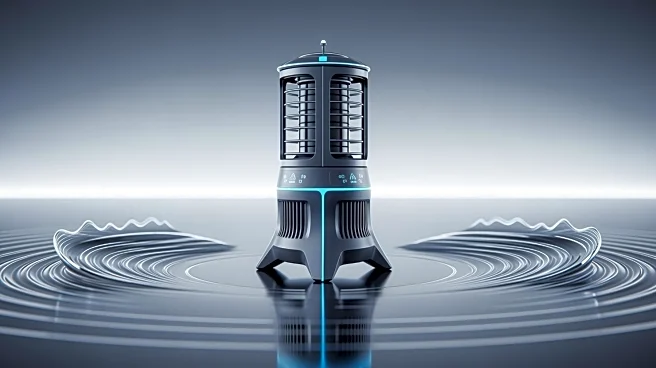What's Happening?
The National Renewable Energy Laboratory (NREL) is advancing its hydraulic and electric reverse osmosis wave energy converter (HERO WEC) through rigorous testing in a wave tank. Since 2024, the team has
been enhancing the device's robustness and reliability by modifying its components. Recent upgrades include replacing the original wire rope with a polyurethane flat belt, which showed superior performance in lab tests. The HERO WEC, funded by the U.S. Department of Energy’s Water Power Technologies Office, is designed to pump seawater through an onshore reverse osmosis system to produce fresh drinking water. The team is now focusing on improving the device's outer body and structure to withstand harsh ocean conditions. The wave tank tests have validated the computer-generated simulations used to predict the device's behavior in real-world conditions.
Why It's Important?
The development of the HERO WEC is significant for advancing renewable energy technologies, particularly in the field of wave energy. By improving the device's durability and efficiency, the project aims to provide a sustainable solution for desalination, which is crucial for addressing global water scarcity. The successful validation of computer simulations through wave tank testing ensures that the device can be optimized for real-world applications, potentially leading to broader adoption of wave energy converters. This advancement could benefit coastal communities by providing a reliable source of fresh water and reducing dependence on traditional energy sources.
What's Next?
Following the successful validation of the simulations, the research team plans to rely on these tools to refine the HERO WEC's design further. The focus will be on maximizing power generation and water production while minimizing the force on the anchor and the device itself. The next steps involve scaling up the prototype and preparing it for longer-term deployments in ocean environments. These developments could lead to commercial applications of the technology, offering a new avenue for sustainable energy and water solutions.
Beyond the Headlines
The HERO WEC project highlights the intersection of engineering and environmental sustainability. By leveraging advanced simulation tools, researchers can design more efficient and resilient energy systems. This approach not only accelerates the development process but also reduces the environmental impact of testing. The project underscores the potential of wave energy as a viable component of the renewable energy mix, contributing to a diversified and resilient energy infrastructure.










